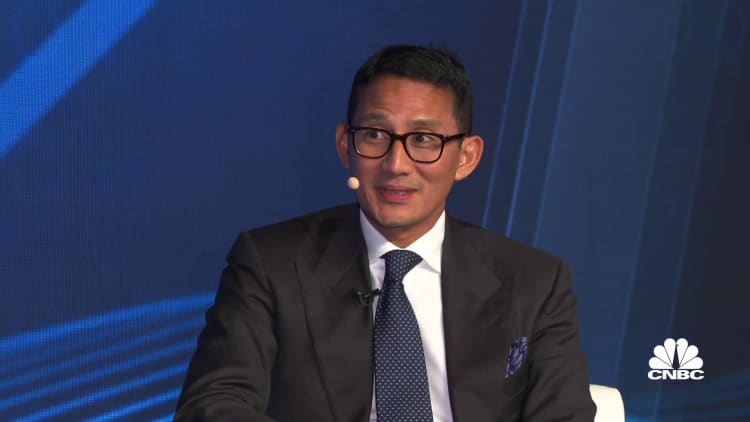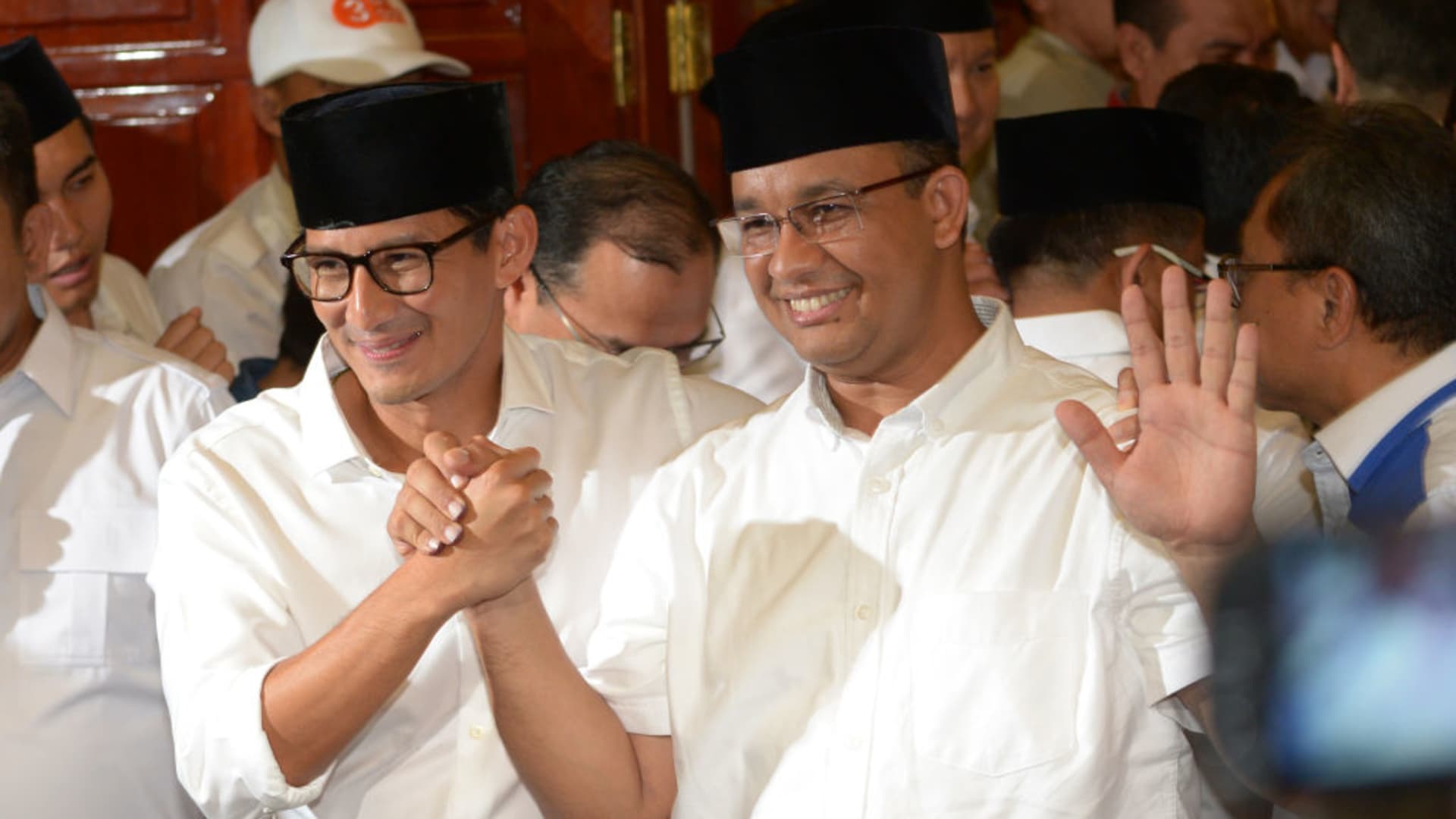Jakarta governor-elect Anis Baswedan (R) and his deputy governor-elect Sandiaga Uno (L) hold hands during a press conference in Jakarta on April 19, 2017.
Adek Berry | AFP | Getty Images
When Sandiaga Uno was appointed Indonesia’s minister of tourism and creative economy, it could not have come at a worse time.
It was December 2020, and the Covid-19 pandemic had prevented people from visiting the country for months.
“I was the minister of tourism and with zero tourists,” Uno told CNBC’s Christine Tan, speaking at an event in Singapore last month.
Indonesia had around 16 million overseas arrivals in 2019, according to government data, and by 2021, the figure dropped to 1.6 million. In 2022, numbers increased to 5.5 million arrivals.
“I said [we] might as well, let’s not have a ministry. We have zero tourists, but then I realized, millions of people have lost their jobs … we were really in a very, very difficult time,” Uno said.
Indonesian President Joko Widodo told Uno: “‘You know what to do,’” Uno recalled. “I had zero clue, what I was going to do, but I was thinking [about] what could really matter to the people.”
It wasn’t the first time Uno — a multi-millionaire entrepreneur and businessman before he became a politician — had a tough career brief. Finding himself unemployed after the financial crisis in Asia in 1997, he set up investment company Saratoga Capital, initially to help failing firms. Being offered the tourism role during the Covid crisis could have been destiny, Uno said, given this experience.
“Maybe this is just my fate, because when I started my business, I focus on company that needs restructuring, company that needs fundraising, basically the company that needs to be revived,” he said.
“[The tourism] sector was home of 45 million Indonesians, and close to 5 million Indonesians lost their job,” he said.
Entrepreneurial mindset
Uno told the ministry: “You need to have a startup mentality, because you’re starting from zero.” The team learned some hard lessons when it came to building the industry back up, he added.
“When the [visitor] … numbers dropped to zero … we forgot about [the] domestic economy. We were targeting foreign tourist arrivals. But we have 280 million people — and this year, we’re targeting 1.4 billion movement[s] of domestic tourists,” Uno told CNBC.
Alongside this tourism push, Uno’s remit is to help the country’s creative industries such as food, fashion and craft industries grow via digital means. Twenty-three million Indonesians work in the sector, and the digital economy will be worth $140 billion this year, up from $70 billion in 2019, Uno said.
Digital connectivity is not distributed evenly, given there are more than 17,000 islands in the region. “We need to bring up to $50 billion in the next years to … focus on our digital infrastructures,” Uno said. “You have beautiful destinations, you have amazing opportunities for small medium enterprises, but [if] you cannot have the connectivity, then it’s going to be put to waste,” he added.
Uno started his career in banking in 1990, taking an MBA at George Washington University in 1992 before joining oil and gas company NTI Resources in 1995. In 2013, he and business partner Edwin Soeryadjaya took the investment arm of Saratoga Capital public after operating it for around 15 years, raising $150 million. Later that year, Forbes named Uno one of Indonesia’s richest people, with a net worth of $460 million.
“The listing was successful, and I’m very grateful. And I was asked by some of the government leaders to think about joining political parties [but I] continued to refuse,” Uno said.

But in 2015, he was approached by Prabowo Subianto, who is currently Indonesia’s defense minister. “He said that: ‘You have been successful, and you have been wealthy and prosperous because of Indonesia. It’s time for you to contribute back to your country.’ And that’s what I did,” Uno said.
A multi-million dollar campaign
He joined the right-wing Gerakan Indonesia Raya party (known as Gerindra), and in 2017 became deputy governor of Jakarta. He resigned in 2018 to become Subianto’s running mate for the presidential election – a campaign that cost the party close to $100 million over the course of a year, Uno said, a figure he partly funded himself.
“Campaigning in, region[al] Indonesia is very, very difficult and expensive, because [of the] logistics from one place to another,” Uno said. The country is the world’s largest archipelagic state.
Subianto lost the election to Widodo, and Uno held no office until Widodo appointed him to his current role in 2020.
In April, Uno announced his intention to join Indonesia’s United Development Party (known as PPP), which he became part of in June. “I’m ready to fight hard for the people,” he said, citing improving the economy and increasing people’s income as a focus for the party in the run-up to the presidential election in 2024.
Does Uno hope to become president one day? “You should ask that to the Indonesian people,” he said.
